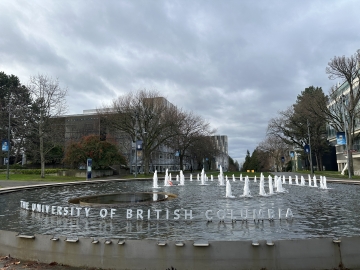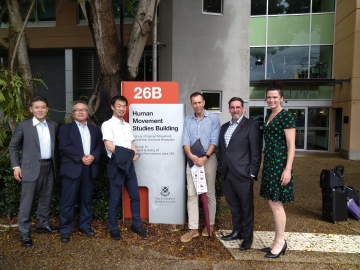
Exploring How to Optimize Safety and Performance in Athletes
A Laboratory with a Focus on Sports Safety—Unparalleled in Japan
 Our laboratory, called the Safety and Performance Optimization Laboratory (SPO), conducts research aimed at optimizing athletes and laborers’ safety and performance by combining exercise physiology with sports medicine. There are almost no laboratories outside of America that focus on sports safety.
Our laboratory, called the Safety and Performance Optimization Laboratory (SPO), conducts research aimed at optimizing athletes and laborers’ safety and performance by combining exercise physiology with sports medicine. There are almost no laboratories outside of America that focus on sports safety.
I am an exercise physiologist and also hold certification as a Certified Athletic Trainer (ATC) in the United States. Because of this background, I always keep in mind the continuum of scientific exploration between field and laboratory in our research: the data obtained in the laboratory are tested in the field for their applicability and effectiveness, and the clinical questions observed in the field are brought back to the laboratory for further examination. We value this continuum because we believe sports science research should always keep in mind what is meaningful to athletes and other stakeholders.
Implementation of Evidence-Based Exertional Heat Stroke Prevention and Treatment
 One of our main research focus is on the subject of exertional heat stress, including measures against exertional heat stroke, which is the most severe type of exertional heat illness. First aid treatment for exertional heat stroke should include the use of an ice bath to cool the whole body before hospital transport—this is a critical step in exertional heat stroke prehospital management to maximize survival and minimize sequela. However, currently this method is not widely accepted in Japan. During our recent Olympic and Paralympic Games, heat stress was one of the primary health concerns. At the request of the International Olympic Committee and the Organising Committee at the Tokyo Olympic and Paralympic Games, I had the privilege of overseeing the implementation of appropriate exertional heat stroke prehospital management for the first time in Japan. My next endeavor would be to translate this experience into a long-lasting legacy in Japanese medical community so that no athletes in Japan suffer from complications from exertional heat stroke.
One of our main research focus is on the subject of exertional heat stress, including measures against exertional heat stroke, which is the most severe type of exertional heat illness. First aid treatment for exertional heat stroke should include the use of an ice bath to cool the whole body before hospital transport—this is a critical step in exertional heat stroke prehospital management to maximize survival and minimize sequela. However, currently this method is not widely accepted in Japan. During our recent Olympic and Paralympic Games, heat stress was one of the primary health concerns. At the request of the International Olympic Committee and the Organising Committee at the Tokyo Olympic and Paralympic Games, I had the privilege of overseeing the implementation of appropriate exertional heat stroke prehospital management for the first time in Japan. My next endeavor would be to translate this experience into a long-lasting legacy in Japanese medical community so that no athletes in Japan suffer from complications from exertional heat stroke.
Exertional heat stroke is not only common in athletes, but also documented among laborers who have unique occupational demands, such as firefighters and police officers. Therefore, our laboratory is also actively engaged in efforts to apply knowledge and methods developed in sports medicine to occupational settings. For example, I have been involved in building heat safety and performance optimization programs at the Fifth Regional Japan Coast Guard as a heat advisor.
Contributing to People’s Safety via Research
 Sports safety is an almost entirely unexplored research field in Japan. Being able to build this field together—while making full use of Waseda University’s strengths as a research base and the network I have cultivated—is a wonderful thing. Joint research with professors in public health and biometeorology on countermeasures against heat stroke is underway, and we also intend to expand our interdisciplinary collaborations with professors in engineering and technology fields in the future.
Sports safety is an almost entirely unexplored research field in Japan. Being able to build this field together—while making full use of Waseda University’s strengths as a research base and the network I have cultivated—is a wonderful thing. Joint research with professors in public health and biometeorology on countermeasures against heat stroke is underway, and we also intend to expand our interdisciplinary collaborations with professors in engineering and technology fields in the future.
Most people who work on site as an athletic trainer will face a variety of questions and challenges every day, just as I did. Translation of these clinical questions to research and figuring out solutions through research has the potential to establish evidence-based practice to help not only the athlete in front of you but also people around Japan and the world. I believe this is the most rewarding experience you can have as a researcher. That being said, people with or without field experience are welcomed to join the laboratory. Together, we will explore how we can apply our expertise as scientists to make a meaningful impact to safeguard and optimize performance of athletes and laborers.
PROFILE
Associate Professor Hosokawa specializes in athletic training and environmental exercise physiology. She graduated from Waseda University’s School of Sport Sciences before getting her Master’s in Athletic Training from the Department of Health, Human Performance and Recreation at the University of Arkansas, USA, and a Ph.D. in Exercise Science from the Department of Kinesiology at the University of Connecticut, USA. She was a lecturer at Ritsumeikan University’s College of Sport and Health Science before coming to her present position in April 2021.








